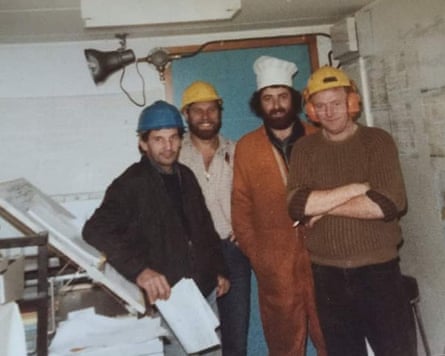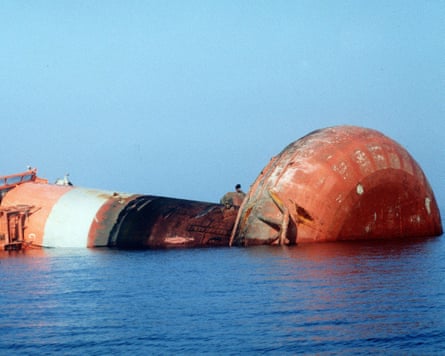“I think we all feel like we’ve had a bit of a weight lifted off our shoulders,” said Laura Fleming after an important milestone in one of Europe’s longest-running industrial disaster sagas. “It is just 45 years too late.”
Fleming’s father, Michael, was one of 123 men who were killed when the Alexander L Kielland accommodation rig capsized during a fierce storm in the Norwegian North Sea oilfields on 27 March 1980.
After decades of campaigning and investigations, no person, body or company has been directly held to account for what happened. But, in a historic vote last week, Norway’s parliament did finally vote to set up a state compensation scheme for relatives of the men who died.

Fleming, 51, was in Oslo at Norway’s parliament, the Storting, to witness the vote and said afterwards she had mixed emotions.
“My mind is always in two places,” she said. “I will always feel in my heart that justice hasn’t been done because, actually, nobody has been personally held to account for the dreadful decisions that were made regarding that rig – by allowing it to be used in the North Sea when it wasn’t safe to do so.
“However, this is a major step. I think it’s a momentous day for everybody, especially the Norwegians who’ve been fighting for the full 45 years.”
The Kielland was a semi-submersible platform about 200 miles off the Norwegian coast. It was housing 212 workers from the nearby Edda drilling rig when one of its five legs, with horrible, lethal suddenness, snapped in a storm. Only 89 people survived.
Michael Fleming, an electrical engineer, was one of 22 Britons killed in the disaster, which led to fundamental changes in safety routines and regulations in the wider oil industry.

A report by experts at the University of Stavanger this year concluded the Norwegian authorities’ actions before and after the collapse were seriously flawed. It said the reputation of the Norwegian petroleum industry was prioritised over providing justice to the survivors and victims’ families.
Eva Joly, one of the report’s authors, said earlier this year: “This incident became a disaster because of a long chain of negligence, omissions and violations of rules designed precisely to prevent an accident becoming a disaster.”
Personal stories from the disaster, including 350 accounts, are gathered at a memory bank created by the university.
Fleming was six when her dad died, so she has only fuzzy recollections, but she cherishes the ones she has.
“I still have some memories of my father – I am quite lucky,” she said. “I met a lady there who was in the womb when her dad died, so she didn’t know him at all.
“We’ve all got very, very different stories. But when we all get together, we’ve all had the same feelings, the same loss of not having a father, mums who struggled by not having a husband.”
When Michael died, the family were in the process of moving from Cumbria to a big, dilapidated house in County Durham. That is where Laura’s mother, Maureen, 82, still lives.
“My mum said that was her catharsis: doing the house up, the garden, going to yoga … that’s what got her through the death of my father.”
The 89 survivors and the bereaved families – between 300 and 400 children lost their fathers, according to campaigners – received some compensation from insurers of the company that ran the rig, but no payout from the state.
The amount of compensation families receive will now be negotiated.
It was 45 years late, but it was the right thing to do, said Fleming, a mediator who works with children. “Norway is a very rich country and now finally they’re deciding to give a tiny bit of that wealth back for those men that unwittingly sacrificed their lives for profits.”
Fleming said hers and other British families had been unaware of the true nature of the accident for years.
The Kielland Network’s founder, Kian Reme, was the person who contacted British families but he died from cancer last year.
About 40 network members were at the Norwegian parliament last week and there was sadness at the absence of Reme, who lost his brother, Rolf, in the disaster.
“If it wasn’t for him, I don’t think any of this would have happened today,” said Fleming. “He never gave up. He was a completely amazing man.”

 3 months ago
93
3 months ago
93

















































